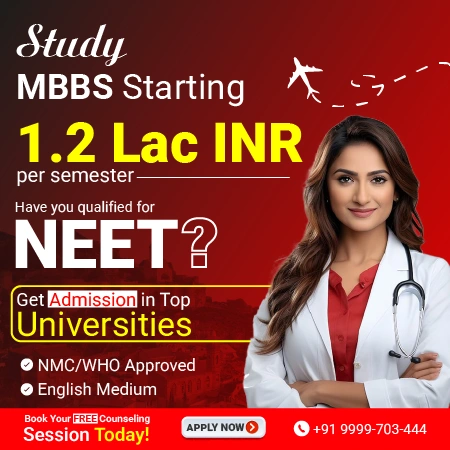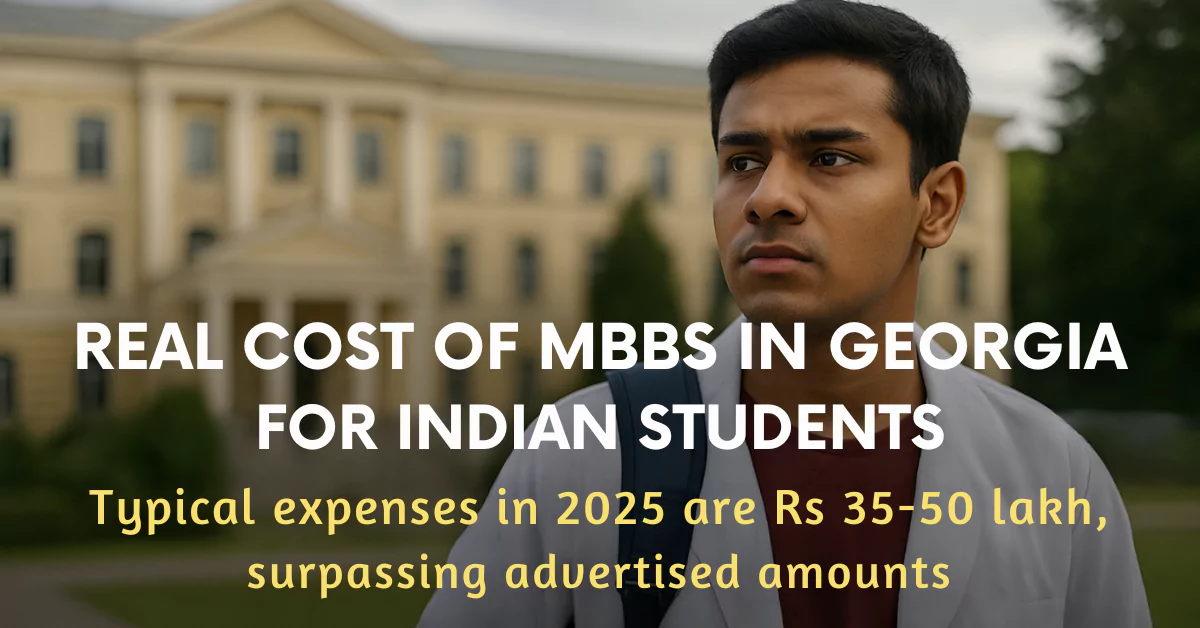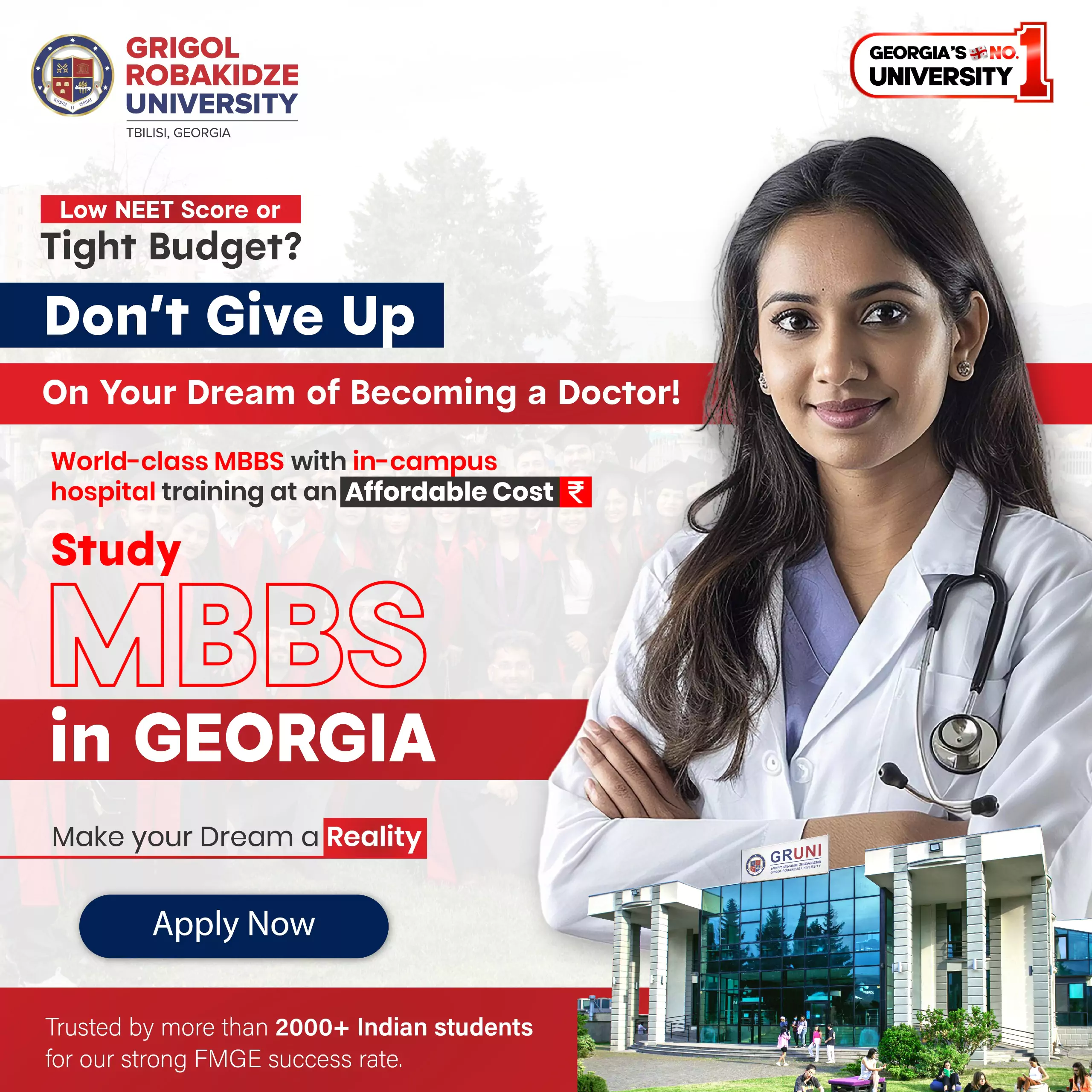What You Will Learn in This Blog
- True cost of MBBS in Georgia in 2025
- University-wise tuition fee comparison
- Breakdown of hostel, food, and living expenses
- Hidden charges agents often skip
- Money-saving tips for Indian students abroad
Studying MBBS in Georgia has become popular for Indian students, but what is the real cost of MBBS in Georgia in 2025? Many agents advertise low tuition fees (like “complete MBBS in Georgia within ₹20–25 lakh”), yet these figures often ignore essential expenses. In reality, MBBS in Georgia typically costs more once you factor in tuition, hostel, food, travel, visa, insurance, and other hidden charges.
According to one estimate, MBBS in Georgia in 2025 will cost an average total of ₹35–50 lakh for the entire 6-year program, including basic amenities. This is still significantly cheaper than private medical colleges in India (which can exceed ₹1 crore), but it’s higher than the “₹20–25 lakh” rumuor.
Subscribe to RM Group of Education Newsletter, Get Admission, Fees, Seats etc.
In this blog, we break down the true budget required, from annual tuition at top NMC-approved universities to living expenses in Georgia, and offer money-saving tips.
By the end, you’ll know the real cost of MBBS in Georgia in 2025 and how to manage it wisely.
Real Cost of MBBS in Georgia for Indian Students
Tuition Fees at Top Universities (GRUNI, TSMU, NVU) Compared
Tuition fees form the major part of your cost of MBBS in Georgia, and they vary by university. Here’s a comparison of annual tuition at some NMC-approved, English-medium universities in Georgia (2025 intake) including a top public university and popular private colleges:
Grigol Robakidze University (GRUNI)
- Private, known for affordable fees.
- Tuition is USD $5500 per year (≈ ₹4.6–4.7 lakh/year).
- Over 6 years that’s about ₹28 lakh tuition.
- GRUNI’s tuition is among the lower range for English-medium MBBS in Georgia, making it an attractive budget option.
Tbilisi State Medical University (TSMU)
- Public, one of the oldest and top-ranked.
- Tuition is around USD $7000 per year (≈ ₹6–7 lakh/year).
- Over 6 years, just tuition comes to roughly ₹40 lakh.
- TSMU’s fee includes exam, lab and other academic.
- Hostel and other fees are separate.
New Vision University (NVU)
- Private, popular among Indian students.
- Tuition is about USD $8000 per year (≈ ₹7 lakh/year).
- Total tuition for 6 years is ~₹35 lakh. NVU often allows payment in installments.
- Hostel is optional each year, ~$2500 if availed in Year 1.
Other examples
- Batumi Shota Rustaveli State University (a state university), around $6000/year (₹4.7 lakh);
- Akaki Tsereteli State University (in Kutaisi) is one of the cheapest with $5000/year (₹3.3 lakh) tuition.
Annual tuition in Georgia ranges roughly from ₹3–7 lakh at most NMC-approved colleges. Government universities tend to be on the higher side of that range (though still far cheaper than Indian private colleges), while some regional or newer colleges are on the lower side.
Be cautious: A lower tuition doesn’t automatically mean a lower total cost – location and other fees matter too.
When budgeting, multiply the annual tuition by 6 (years). For instance, at TSMU ~₹6.7L/year comes to ~₹40L for tuition alone. Many students forget to do this math and only hear “₹6 lakh per year” without realizing it means ₹36+ lakh over the course. Plan for the entire program duration.
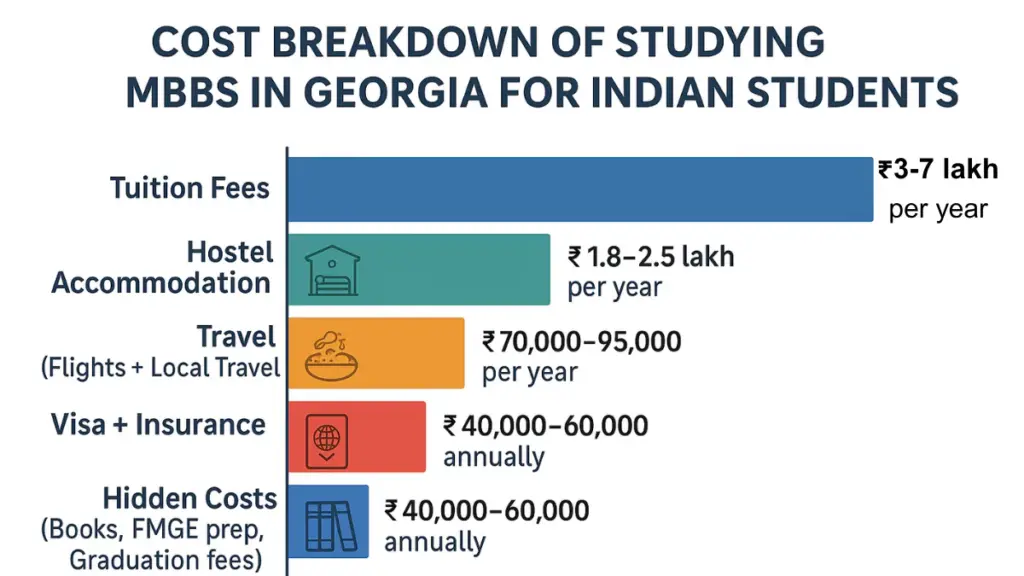
Cost of MBBS in Georgia: Hostel, Mess & Off-Campus Cost
Apart from tuition, accommodation and food are the next major expenses. Georgian universities offer on-campus hostels (and mess facilities), but students can also live off-campus. Let’s break down typical costs:
MBBS in Georgia: Hostel Fees
- Most universities provide dormitories for international students.
- On average, hostel charges range from ₹40,000 to ₹90,000 per year (roughly $500–$1200/year).
- For example, GRUNI’s official hostel+mess fee is $2500 per year (≈ ₹2.30 lakh/year) for a shared room with amenities.
- Private universities like NVU have hostels in the ~$2500–$3000 range per year as well.
- These typically include basic furniture, utilities, and sometimes a mess.
Mess and Food Cost of MBBS in Georgia
- If hostel fee includes a mess, it usually covers two or three meals a day (with some Indian menu options in universities that have many Indian students).
- If food isn’t included, or if you eat outside, budget roughly $100–$150 per month for food.
- That’s about ₹8,000–₹12,000 per month (₹1–1.5 lakh per year).
- Many Indian students in Georgia cook their own food to save money (groceries are reasonably priced), and also frequent Indian restaurants or messes around campus for a taste of home.
Off-Campus Rent in Georgia
- Some students, after the first year, choose to rent apartments in Tbilisi or other cities instead of university hostels.
- This can be cost-effective if you share.
- For instance, a 2-bedroom apartment in Tbilisi might cost ~₹30,000–₹40,000 per month (around $350–$500, depending on location).
- Split between 2–3 roommates, that’s ~₹10,000–₹15,000 per month per person. In smaller cities (Batumi, Kutaisi), rents can be lower.
- Off-campus living gives you more freedom (and often more space), but remember to add utilities (electricity, heating, water, internet) which can be another ₹5,000–₹8,000 per month combined if not included.
Utilities & Miscellaneous Cost
- If you’re in a hostel, electricity, water, heating, and Wi-Fi may be included or nominal.
- If renting outside, expect to pay for utilities.
- On average, utilities cost around ₹5,000 per month in Georgia for a small apartment (heating can drive up costs in winter).
- High-speed Internet is quite affordable (~₹1,500–₹2,000 per month for a decent plan).
- A local SIM with data might be ₹500–₹1000/month.
Overall, living expenses (accommodation + food + other living costs) in Georgia usually come to about $300–$500 per month (≈ ₹25,000–₹40,000 per month) depending on lifestyle.
This means roughly ₹3–4.5 lakh per year on living costs. Students on a tight budget, sharing rooms and cooking at home, might manage on the lower end (₹2.5–3 lakh/year). Those who prefer more comforts or live in the capital city center will be on the higher end.
By Georgian standards, the cost of living is moderate and often cheaper than big Indian metros, for example, local transport and produce are cheaper, but be prepared for expenses like heating in winter or craving for imported food which can add up.
MBBS in Georgia Additional Costs: Travel, Visa, Insurance & More
Beyond tuition and living expenses, don’t forget the “additional” costs of studying abroad. These are often one-time or periodic expenses.
Student Visa & Residence Permit
- Georgia’s student visa fee is very low, only around USD $20 (approximately ₹1,600) for the application.
- Many Indian students actually enter Georgia initially on an e-visa or short-term visa and then obtain a Residence Permit (ID card) after enrollment.
- While the visa itself is cheap, you may incur minor fees for visa extension or the residency card each year (some universities assist with this).
- Always renew your documents on time to avoid fines.
Travel Cost
- You’ll typically fly India to Georgia and back at least once a year (for summer or winter vacations).
- A round-trip flight ticket can range from ₹30,000 to ₹50,000 depending on booking time and route (there are no direct flights, usually you connect via Dubai, Doha, etc.).
- Budget ~₹40k/year for travel, or more if you plan additional trips. Booking well in advance and taking advantage of student discounts can lower this cost.
Health Insurance
- Georgian law requires students to have health insurance coverage.
- Universities often help arrange a local insurance plan.
- The cost can be around ₹10,000–₹15,000 per year for basic coverage. (That’s roughly $125–$200/year – quite affordable for basic plans.)
- However, some students opt for international insurance which can cost more ( $50–$100 per month for premium plans, but most budget-conscious students go with cheaper local policies).
- Ensure your insurance covers routine healthcare and emergencies – medical care is not free in Georgia.
One-Time University Charges
- In first year, be ready for one-time administrative expenses.
- These might include application fees (USD $50–$200), admission letter/courier charges, registration fees, visa invitation charges, etc.
- For example, at TSMU the first year included around $2,300 in one-time charges (admission and enrollment fees, etc.).
- Not all universities charge that much upfront, but you should confirm what first-year “miscellaneous” fees you need to pay upon joining.
- Additionally, some universities charge small semester fees (for exams, student union, lab materials) each semester (could be $100–$500 per year).
Books, Instruments & Uniform
- Unlike in India where some government colleges subsidize books, abroad you’ll likely buy your own textbooks or e-books.
- Medical textbooks can be expensive, plan perhaps ₹20,000–₹30,000 per year for books, especially in the pre-clinical years.
- Many students save by using e-books/PDFs or buying second-hand from seniors.
- You’ll also need a medical kit (stethoscope, lab coat, dissection kits, etc.), maybe another ₹10,000 initially.
- Georgia can be cold, so appropriate winter clothing is a must-buy.
Tip: Carry a couple of white coats from India; they’re cheap here and you’ll need them from day one.
Miscellaneous/Admin
Some other occasional costs:
- Translating and notarising documents (might need your education certificates translated to Georgian – each document ~₹3,000 if not provided in English), police clearance and medical tests before departure (HIV test, etc.), luggage and travel gear, a local SIM card and initial top-ups, etc.
- Individually, these are small, but together they can be a few thousand rupees.
These additional costs can easily account for a few lakhs over the course of MBBS. For instance, a rough addition would be: Visa/permits over 6 years ~₹15k, flights ~₹2–3 lakh (if ~₹40–50k * 6 trips), insurance ~₹60–90k (₹10–15k * 6), books & materials ~₹1–1.5 lakh, one-time uni fees ~₹50k–1 lakh. That’s about ₹5–7 lakhs of “extras” beyond tuition and living costs. It’s crucial to budget for these from the start so you’re not caught off guard. Many parents set aside a contingency fund for such expenses and emergencies.
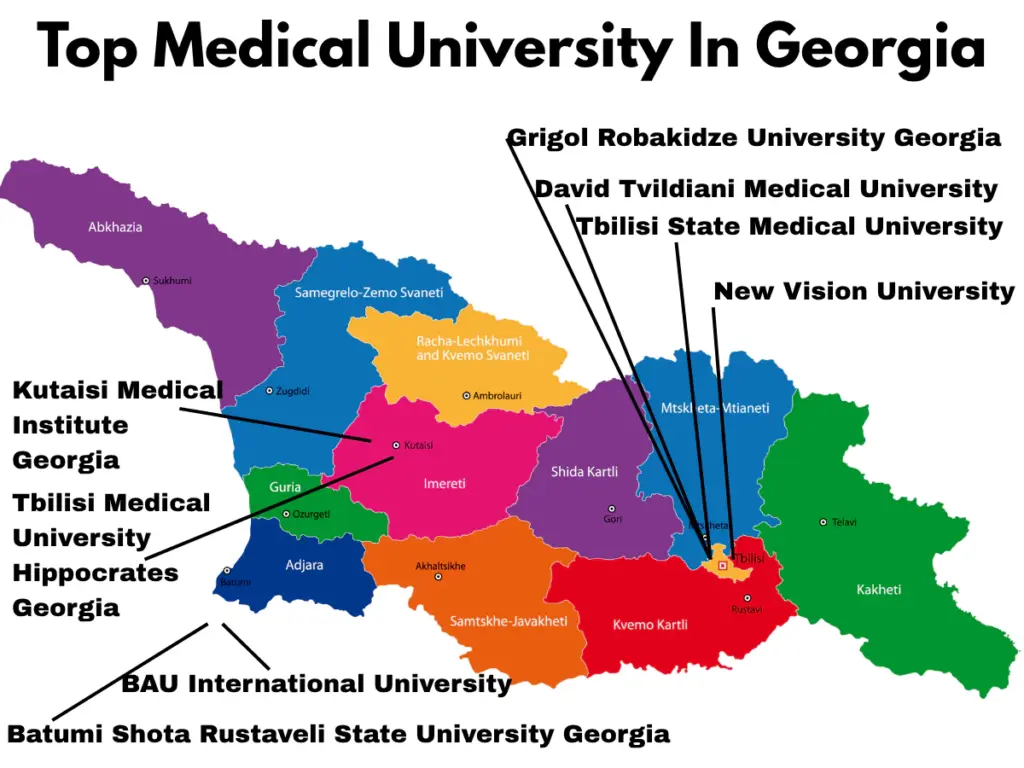
Hidden Costs Most Agents Don’t Tell You About
When agents say “affordable MBBS in Georgia,” they often highlight “No donation, no capitation fee, low tuition”, which is true, there are no donation fees and tuition is relatively low. However, this can create a false impression that ₹20–25 lakhs covers everything. In reality, there are hidden or overlooked costs you should be aware of:
Living Expenses
- Some consultants might quote only tuition + hostel and ignore daily living costs (food, transport, etc.).
- For example, an agent might say “Georgia MBBS – $5000 tuition + $2000 hostel per year” but do not mentiont that you’ll spend another $2500+ on food, local travel, personal needs, etc.
- If you don’t account for that, your budget will fall short.
- The cost of food, personal items, weekend outings, sim cards, etc., can add up to $100–$200 a month even on a tight student budget.
Visa Extensions & Documentation
- While the visa fee is only $20, obtaining and renewing your residence permit annually may involve some fees or at least bureaucratic steps (and possibly using an agent’s help in Georgia).
- It’s not huge, but it’s not free either, and missing a renewal can incur fines.
- Also, initial paperwork ( Notarizations of your educational documents) cost both time and money.
Medical Checkups & Insurance Exclusions
- Some universities require an annual medical checkup for students (especially post-COVID, to ensure health).
- This might not be covered by insurance, meaning you pay out-of-pocket.
- Likewise, basic insurance might not cover dental or vision, which could be extra if you need care.
- These are minor costs, but still costs nonetheless.
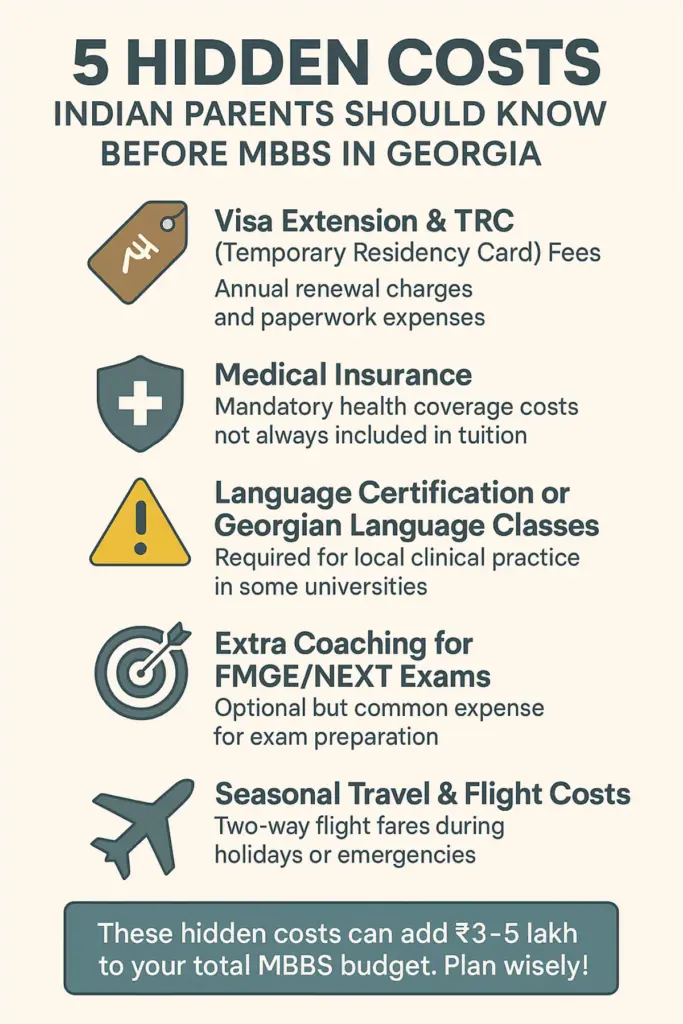
Exchange Rate Fluctuations
- This is a hidden cost that students and parents often overlook.
- The fees might be quoted in US Dollars (or Georgian Lari), but you are paying in Indian Rupees converted to those currencies.
- Over 5-6 years, currency rates can change. For instance, if 1 USD was ₹75 when you joined and becomes ₹85 a few years later, your annual tuition effectively costs you a lot more in INR.
- This currency risk can increase your total expense by several lakhs if the rupee weakens.
- It’s wise to budget an extra 5-10% as a buffer for possible forex changes over the course duration.
Note: Some students pre-pay multiple years of tuition when the exchange rate is favorable, but that’s not always feasible.
Agent Service Charges or Hidden University Fees
- Most reputed consultants charge either a transparent service fee or get compensated by the university.
- But be wary of any “hidden” charges like “registration fee” that is unusually high.
- Always ask for a breakdown: actual university fees versus any fees payable to the agent. Ideally, pay tuition directly to the university account.
- Some students also reported surprise charges in Georgia like a “library fee” or “lab fee” each year, these tend to be small (maybe $100/year) but should be noted in the fee structure.
Travel and Vacation Costs
- During long breaks, if you stay back in Georgia, you’ll spend on living expenses there; if you come home to India, you spend on flights.
- Either way, there’s a cost. Agents rarely discuss this in their cost summary.
- Also, if your university offers exchange programs or if you plan to do clinical electives abroad in final year, those are additional costs you might voluntarily take on.
Retaking Exams or Extended Duration
- Not something anyone plans for, but if a student fails a year and has to repeat, that’s another year’s tuition and living cost.
- While Georgia has a good quality of education, ensure you keep up academically to avoid extension of your course (and budget).
- Some students also prepare for exams like FMGE, USMLE or PLAB during MBBS, the coaching or exam fees for those are another consideration (though not mandatory, only if you choose those paths).
How to Save Money During Your MBBS in Georgia
While the costs are significant, there are plenty of ways to save money and manage your budget smartly as an MBBS student in Georgia:
Choose Your University and City Wisely
- Tuition fees are fixed by the university, but cost of living can depend on the city.
- Tbilisi (the capital) has slightly higher living costs than smaller cities like Batumi or Kutaisi.
- If you are very budget-conscious, you might consider a reputable university in a smaller city where rents and food are cheaper.
- Also, compare fee structures, a university with slightly higher tuition but providing hostel + meals might turn out cheaper overall than one with lower tuition but high living costs.
- Look at the full 6-year cost (some universities publicly list total package in USD or INR, use those for comparison).
Take Advantage of Student Discounts
- Your Georgian student ID card can get you discounts on public transport, museums, some restaurants, and even flights.
- In Tbilisi, students pay discounted fares on the metro/buses (public transport in Georgia is anyway cheap, a bus ride might be ~50 tetri, which is ₹15!).
- Utilize public transport instead of taxis, it’s not just cheaper, it’s also safe and reliable in most cases.
Cook Your Own Meals
- Eating out frequently (especially at international fast food chains or restaurants) can drain your budget.
- By cooking at home or in your dorm (many hostels have common kitchens), you can save a lot.
- Georgian markets have fresh vegetables, fruits, and meat at reasonable prices.
- Many Indian students bring along spices or ready mixes from home to recreate Indian dishes cheaply.
- Perhaps form a cooking club with friends, taking turns to cook can be fun and economical.
- That said, do enjoy local Georgian cuisine occasionally, just budget for it as a treat, not daily.
Shared Accommodation
- If hostel is too expensive or not to your liking after the first year, team up with friends to rent an apartment.
- A 2 or 3-bedroom flat split among roommates often costs less per head than the hostel, and you might save on food by cooking together.
- Just be mindful of utility bills.
- Also, sharing subscriptions (like high-speed wifi, which you can split the cost) or even textbooks among friends is another way to cut costs.
Avoid Unnecessary Travel and Luxury
- While studying abroad, it’s tempting to tour around (Georgia is a beautiful country and also a gateway to Europe).
- By all means, explore and enjoy, but do it wisely.
- Plan trips during off-peak times, use student travel cards, and limit trips home to India to maybe once a year if your budget is tight.
- Each extra flight home could be another ₹40k you save by staying put or traveling locally instead.
- Likewise, gadgets, branded clothing, etc., can eat into your budget, remember your primary goal is your education; you can reward yourself after completing the degree!
Scholarships and Part-Time Work
- Look out for any scholarships offered by your university or external organizations.
- As for part-time jobs: Georgia technically allows international students to work part-time, but realistically, between a rigorous MBBS schedule and the language barrier (most locals speak Georgian and some Russian), it’s tough to find good part-time work in the medical field.
- Some students do freelance online gigs or tutoring to earn a bit of pocket money, but don’t bank on earnings to fund your fees.
- If you have a unique skill (like IT, graphic design, etc.), you might freelance online.
- Ensure any work does not violate your visa conditions (usually part-time work is allowed, but confirm current regulations).
- Even earning an extra $100–200 a month can offset your living costs a little.
Plan Currency Exchanges Smartly
- Get a forex card with good rates or use international bank accounts that students use.
- Some banks in India offer zero-conversion markup cards, useful for paying fees in USD.
- Transfer tuition fee in larger tranches to avoid repeated bank charges.
- Keep an eye on exchange rates; if INR is strengthening, that’s a good time to send money ahead if possible.
- Over six years, even a small difference in rate can save or cost you a lakh or two, so planning forex is part of money-saving.
Use Senior Students as Resources
- Seniors who’ve been in Georgia a few years have wealth of tips, from where to buy cheaper groceries, to which hostel has free laundry, to selling you used textbooks at a discount.
- Connect with the Indian student community (there are Facebook/WhatsApp groups for Indian MBBS students in each university).
- They can also warn you about common spending mistakes they made, so you can avoid them.
By implementing these strategies, many Indian students manage to keep their expenses towards the lower end of the range. For instance, living simple life and sharing everything, some have reported spending about ₹15–₹20k per month on living expenses, but it requires discipline and it’s doable. Every rupee saved is one less rupee you or your parents need to pull from loans or savings.
Real Student Budget: Monthly Expense Table (2025)
To put things in perspective, here’s an approximate monthly budget of an Indian MBBS student in Georgia (in 2025). This assumes a relatively simple lifestyle with shared accommodation off-campus (not the highest, not the lowest, a middle-ground scenario). Keep in mind individual budgets vary, but this gives a real snapshot of typical expenses:
| Expense Category | Monthly Cost (approx) | Notes |
|---|---|---|
| Housing (Rent/Hostel) | ₹8,000 – ₹12,000 | If sharing an apartment in Tbilisi, ~₹10k each. In university hostel, similar range per month; often paid semi-annually. |
| Food & Groceries | ₹10,000 – ₹12,000 | Cooking at home + occasional mess/outing. Pure hostel mess users might pay a fixed ~₹8k/month if included. |
| Utilities (Electricity, Water, Heating) | ₹3,000 – ₹5,000 | Higher in winter due to heating; often included in hostel fee, but paid separately in apartments. |
| Internet & Phone | ₹2,000 | High-speed home Wi-Fi ~₹1500 and mobile plan ~₹500 per month. |
| Local Transportation | ₹1,000 – ₹1,500 | Public transport is cheap: student metro/bus passes, occasional taxi split with friends. |
| Personal Expenses (clothing, toiletries, recreation) | ₹3,000 – ₹5,000 | Laundry, shampoo, clothing, movie outings, gym, etc. , varies by individual. Many live on ₹3k for basics; anything above that is discretionary. |
| Monthly Total | ~₹30,000 – ₹35,000 | Approximately $360–$420 per month. |
Notes: If you stay in the university hostel and have a mess plan, your housing+food might be a fixed package (e.g. TSMU hostel+mess ~₹21k/month). On the other hand, if you prefer a single apartment or eat out frequently, your monthly expense can shoot past ₹50k.
This table is a realistic budget. It’s wise to track your expenses in the first few months to adjust these estimates to your lifestyle. Many students are surprised where their money goes until they start tracking, small things like a cup of coffee or extra data packs can add up. By maintaining roughly ₹30k/month budget, one can live comfortably as a student in Georgia without financial strain.
Is MBBS in Georgia Worth the Cost?
After tallying up all the numbers, you might ask: Is MBBS in Georgia worth the ₹35–40+ lakh? The answer depends on your individual circumstances, but for many Indian students, Yes, it is worth the cost.
What you get for the money
- A globally recognized medical degree (from an NMC-approved university), medium of instruction in English, and the opportunity to study medicine without the crippling fees of private colleges in India or the cutthroat competition of NEET for government seats.
- The total cost of MBBS in Georgia (₹35–50 lakh) is a fraction of what a donation-seat in an Indian private medical college would cost (often ₹1 crore or more).
- Plus, living in a new country offers exposure and independence that can be invaluable personally and professionally.
Quality of education
- Georgia’s top universities like GRUNI, TSMU, DTMU, etc., provide solid education with modern infrastructure.
- If you choose your university wisely (ensure it has good clinical exposure, affiliated hospitals, and a track record of graduates clearing licensing exams), the education you receive will be on par with your investment.
- Many graduates from Georgia successfully pass their FMGE (licensing exam in India) or pursue post-graduate education worldwide, a testament that it can be a good MBBS abroad option.
- You must be proactive (clinical rotations, extra prep for licensing exams) to maximize the return on your investment.
Financial planning
- That said, ₹40 lakh is not a small sum.
- It often involves life savings or educational loans.
- You and your family must plan how to finance the entire course (not just the first year).
- Educational loans are available and many banks in India offer loans for NMC-approved foreign universities, with interest, you’ll be repaying it for years, so factor that in when deciding.
- The affordability also depends on your personal financial situation: for some, Georgia is an affordable alternative, for others it’s still expensive but the only viable route to their dream of becoming a doctor.
Caution Note: Always keep a buffer in your budget for unforeseen events (e.g., medical emergency, currency fluctuation, etc.).
MBBS in Georgia is worth the cost if you:
- Cannot secure a government MBBS seat in India and do not want to pay ₹1+ crore in a private Indian college.
- Choose a good university in Georgia that is truly English-medium and provides quality education (and is approved by NMC).
- Prepare to work hard (since you’ll need to clear licensing exams to practice in India, and the self-study component abroad is high).
- Plan your finances responsibly, possibly through loans or savings, and are ready to live within a student budget for 5-6 years.
Thousands of Indian students have walked this path and become successful doctors. They’ll tell you that the experience, new culture, new friends, learning to be self-reliant, is enriching. The cost is significant but not unmanageable, especially with the tips and clarity on hidden charges as discussed.
In conclusion, MBBS in Georgia in 2025 can be a wise investment for your career, as long as you go in with a realistic budget and mindset. It’s affordable compared to many alternatives abroad.
Keep this guide and your budget notes handy throughout your course. Periodically revisit your finances each year, costs can change (tuition can increase by a small percentage annually, or maybe you move to an apartment, etc.). Adjust and plan ahead. With good planning, you’ll finish your MBBS in Georgia with not just a degree in hand, but also with financial stability and no debt burdens.

